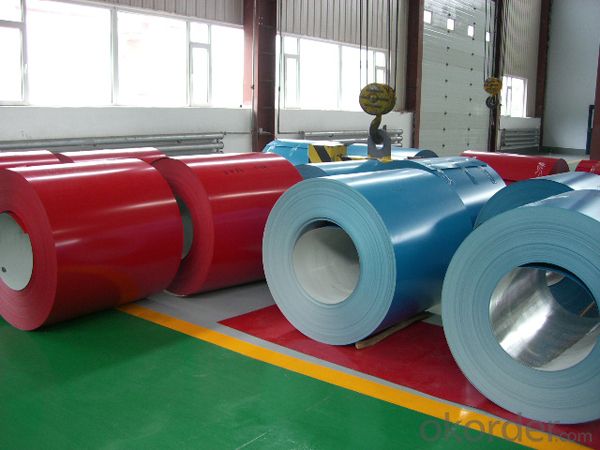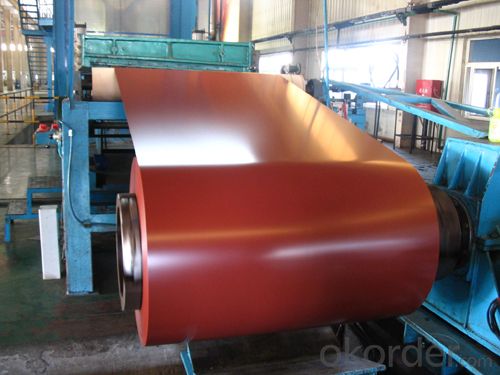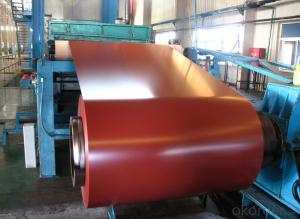Coated Aluminium Tape for Aluminium Rolling Shutter Doors
- Loading Port:
- Shanghai
- Payment Terms:
- TT OR LC
- Min Order Qty:
- 5 m.t.
- Supply Capability:
- 60000 m.t./month
OKorder Service Pledge
OKorder Financial Service
You Might Also Like
Item specifice
Coated Aluminium Tape for Aluminium Rolling Shutter Doors
Description
Alloy | 1060, 1100, 3003, 8011, etc. |
Temper | H16, H18, H24, H26, H28 |
Thickness | From 0.05mm to 3.0mm |
Width | Standard width:1240mm |
Special width:1300mm, 1520mm, 1570mm, 1595mm | |
Diameter | Standard dia:1200mm |
Interior dia:150mm,405mm,505mm | |
Weight | 2.5 T/coil,3.0 T/coil |
Coating | PE, PVDF, ACRYLIC |
Surface | Embossed, mill finish, coated |
Color | AS to code RAL |
Gloss | 10-90%(EN ISO-2813:1994) |
Coating Thickness | PE: more than 18 micron |
PVDF: more than 25 micron | |
Coating Hardness(pencil resistance) | More than 2h |
Coating adhesion | 5J (EN ISO-2409:1994) |
Impact Resistance | No peeling or cracking(50 kg/cm,ASTMD-2794:1993) |
Flexibility(T-bend) | 2T |
MEK resistance | More than 100 |
Advantage | 1.High temperature resistant 2.Weathering resistant 3.Scrubbing resistant 5.Acid or alkali proof 6. Fireproof 7.Light weight material is easy to construct and install |
Out package | Wooden splint with export standard |
Application | ACP, wall cladding, facades, roofs and canopies, ceilings, signboards, blind window, display platforms, electrical panels, etc |
Manufacturing
Decoiler → Accumulator →Tension Leveler →Acid & Alkali Cleaner → Rinse →Conversion Treatment → Priming coater →Infrared Curing Oven →Main coater →Floatation Curing Oven →Strippable Film Applicator → Exit Accumulator → Recoiler


Polyester Coatings (PE)
PE (polyester) coatings exhibit an excellent combination of hardness, flexibility, flow, appearance, and superior resistance to dirt retention in indoor and outdoor applications. These coatings are highly resistant to abrasion, metal marking, staining, and marring, and require minimal maintenance. Glazetech uses polyester paints which provide excellent colour and gloss retention properties.
Polyvinylidene Fluoride Coatings (PVDF)
PVDF (polyvinylidene fluoride) is a chemical resistant thick film barrier coating commonly used in architectural applications where both excellent appearance and substrate protection must be maintained over a long period of time. This coating is unaffected by most chemicals and solvents and has excellent wear and abrasion resistance. PVDF also has a high dielectric strength, excellent resistance to weathering and the ability to self extinguish.
Application
Widely used in manufacturing of products as well as other industrial applications like:
Products Materials: PP cap stock, the traffic sign, air-conditioner heat and exchangers, food container, household foil, pharmaceutical packing, cigarettes packing etc.
Building Materials: aluminum curtain wall base plate, ACP, aluminum, ceilings, aluminum sheets, honeycomb panels and aluminum roofing, lighting decoration, household electrical appliances, food package (such as pop can cover & ring-pull), furniture ect.
FAQ
--Q: Do you provide free samples?
--A: Yes, free samples will be sent to you on freight at destination.
--Q: Can I get your latest products catalogue?
--A: Yes, it will be sent to you in no time.
--Q: What is the MOQ?
--A: 2 tons
--Q: What are your payment terms?
--A: We accept L/C, T/T.
--Q: What kinds of alloy can you supply?
--A: 1000 series: 1050, 1060, 1070, 1100, 1145, 1200
3000 series: 3003, 3004, 3105, 3104
5000 series: 5052, 5083, 5754, 5182
6000 series: 6061, 6063, 6062, 6063
8000 series: 8011, 8021
--Q: What kinds of temper can you supply?
--A: O-H112: O,H12,H14,H16,H18,H22,H24,H26,H,32,H34,H111,H112
T3, T4, T6
- Q:What is the melting point of aluminum coils?
- The melting point of aluminum coils is approximately 660 degrees Celsius or 1220 degrees Fahrenheit.
- Q:What are the different coil pattern options for aluminum coils?
- Aluminum coils offer diverse coil pattern options to cater to specific applications and desired aesthetics. Here are some commonly used patterns: 1. Stucco Pattern: This option imitates the appearance of stucco with a textured, raised surface. It offers durability and a non-slip surface, making it suitable for outdoor surfaces and flooring. 2. Diamond Pattern: Featuring small diamond-shaped embossed designs, this pattern provides an attractive and slip-resistant surface. It finds applications in stair treads, walkways, and decorative panels. 3. Wood Grain Pattern: This pattern replicates the natural wood grain, making it an appealing choice for architectural and interior design purposes. It is commonly used in wall cladding, ceiling panels, and furniture. 4. Checkered Pattern: Also known as the checker plate pattern, it showcases a grid of raised diamonds or squares. This pattern offers excellent slip resistance and finds utility in safety-focused applications like ramps, industrial flooring, and staircases. 5. Plain Smooth Pattern: This versatile pattern has a flat, smooth surface without any embossed designs. It suits various applications such as roofing, gutters, and general fabrication. 6. Ribbed Pattern: Consisting of parallel lines or ribs along the coil's length, this pattern provides enhanced strength and rigidity. It is commonly used in truck bodies, trailers, and industrial equipment. These examples highlight the array of coil pattern options available for aluminum coils. The appropriate pattern selection depends on project-specific requirements, including functionality, durability, and aesthetic preferences.
- Q:My boyfriend sweats a lot and uses Mitchlum deodorant, a lot of it, under his armpits and waits til it dries to stop the sweating. I heard aluminium was bad for you, but he says natural deodorants don't work as well. What do you think?
- This is doctrine according to me, so Don't take it for absolute truth. I had a science teacher who said the aluminum in deodorant was bad for you because you have major arteries in your armpits that go to the rest of your body and it carries it there and is linked to things like alzheimers (please excuse my spelling). Then I had another teacher who said that that was complete rubbish. Aluminum is everywhere. If it was going to do that from deodorant, it would do it from a million other things. Oh, and certain deodorants work for certain people, others not so well. I actually have to switch types every once in a while because the one I use stops working. In my experience, the natural stuff doesn't work as well. So, you don't have to believe me, but you asked what I thought.
- Q:How do aluminum coils contribute to thermal insulation in buildings?
- Aluminum coils contribute to thermal insulation in buildings by acting as a barrier against heat transfer. These coils are often used in HVAC (heating, ventilation, and air conditioning) systems to ensure efficient cooling and heating. The aluminum material has a high thermal conductivity, which allows it to quickly absorb and dissipate heat. By regulating the temperature, aluminum coils help in maintaining a comfortable indoor environment while reducing energy consumption and associated costs. Additionally, they are lightweight and corrosion-resistant, making them a durable and cost-effective choice for thermal insulation in buildings.
- Q:Can aluminum coils be used for decorative purposes?
- Yes, aluminum coils can be used for decorative purposes. Aluminum is a versatile material that can be easily shaped and manipulated, making it suitable for a wide range of decorative applications. Aluminum coils are often used to create decorative trim, accents, and borders in various industries such as architecture, interior design, and automotive design. They can be painted or coated with different finishes to enhance their visual appeal and match the desired aesthetic. Due to their lightweight nature and durability, aluminum coils are also commonly used for decorative purposes in outdoor settings, such as garden ornaments, sculptures, and signage. Overall, aluminum coils offer a cost-effective and aesthetically pleasing option for incorporating decorative elements into various projects.
- Q:How are aluminum coils protected against dust and dirt during storage?
- Various measures are implemented to safeguard aluminum coils against dust and dirt during storage, guaranteeing their quality and preventing potential damage. One commonly employed technique involves securely wrapping the coils with protective coverings, such as plastic or polyethylene sheets, effectively creating a barrier against dust and dirt particles. These coverings are usually sealed tightly to prevent any entry of contaminants. Besides wrapping, other precautions are taken to minimize the risk of dust and dirt buildup. Storage areas are diligently maintained and cleared of debris to decrease the chances of contaminants settling on the coils. Regular cleaning and maintenance of the storage space are necessary to maintain a dust-free environment. Furthermore, storage facilities utilize proper ventilation and air filtration systems to regulate airborne particles and uphold a clean atmosphere. These systems aid in reducing the amount of dust and dirt that can accumulate on the coils. Proper handling of the aluminum coils during transportation and storage is also crucial to prevent unnecessary exposure to dust and dirt. Employing appropriate handling equipment and techniques, such as using clean gloves and avoiding dragging the coils on the ground, helps avoid the accumulation of contaminants. By implementing these protective measures, aluminum coils can be stored safely and securely, ensuring the preservation of their quality and averting any potential issues arising from dust and dirt buildup.
- Q:Why does the end face of aluminum coil have grease spots?
- Process one without coolant to see whether there are spots. There is a layer of alumina membrane on the blank face of aluminum coil, which will react with basic coolant when heating through processing.
- Q:How are aluminum coils different from other types of metal coils?
- There are several ways in which aluminum coils differ from other types of metal coils. Firstly, aluminum is a lightweight metal, resulting in much lighter coils compared to those made from steel or copper. This lightweight nature of aluminum makes it highly sought after in industries where weight is a crucial consideration, such as aerospace and automotive industries. Secondly, aluminum coils have exceptional resistance to corrosion. Unlike other metals, aluminum forms a protective oxide layer on its surface when exposed to air, effectively preventing further corrosion. This corrosion resistance makes aluminum coils ideal for use in environments that are humid and prone to corrosion, such as marine or coastal areas. Moreover, aluminum coils boast high thermal conductivity. This means that aluminum can efficiently transfer heat, making it an excellent choice for heat transfer applications like HVAC systems, refrigeration units, and radiators. The high thermal conductivity of aluminum coils enables more efficient cooling or heating processes. Additionally, aluminum is highly malleable and ductile. This means it can be easily shaped and formed without compromising its structural integrity. The malleability of aluminum coils allows for flexibility and versatility, enabling them to be manufactured into various shapes and sizes to meet specific industry requirements. Lastly, aluminum is an environmentally sustainable and recyclable material. It can be recycled repeatedly without any degradation in quality or performance, making aluminum coils an environmentally friendly option. This recyclability aspect helps reduce the environmental impact and supports a circular economy. In conclusion, aluminum coils stand out from other metal coils due to their lightweight nature, corrosion resistance, high thermal conductivity, malleability, and recyclability. These unique properties make aluminum coils a preferred choice for a wide range of applications across different industries.
- Q:Are aluminum coils suitable for beverage can manufacturing?
- Yes, aluminum coils are suitable for beverage can manufacturing.
- Q:What are the common surface protection methods for aluminum coils?
- The common surface protection methods for aluminum coils include anodizing, painting, and coating with protective films or laminates.
1. Manufacturer Overview |
|
|---|---|
| Location | |
| Year Established | |
| Annual Output Value | |
| Main Markets | |
| Company Certifications | |
2. Manufacturer Certificates |
|
|---|---|
| a) Certification Name | |
| Range | |
| Reference | |
| Validity Period | |
3. Manufacturer Capability |
|
|---|---|
| a)Trade Capacity | |
| Nearest Port | |
| Export Percentage | |
| No.of Employees in Trade Department | |
| Language Spoken: | |
| b)Factory Information | |
| Factory Size: | |
| No. of Production Lines | |
| Contract Manufacturing | |
| Product Price Range | |
Send your message to us
Coated Aluminium Tape for Aluminium Rolling Shutter Doors
- Loading Port:
- Shanghai
- Payment Terms:
- TT OR LC
- Min Order Qty:
- 5 m.t.
- Supply Capability:
- 60000 m.t./month
OKorder Service Pledge
OKorder Financial Service
Similar products
New products
Hot products
Related keywords




























